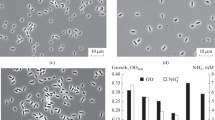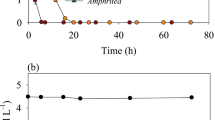Abstract
Cyanobacteria are among the earth’s oldest known living groups of organisms and can form layered accretions called microbialites, found in both the fossil record and existing lakes. Studies of cyanobacterial biochemical processes help to understand the evolution of life on earth. The conserved metabolism of cyanobacterial species includes the biosynthesis of unusual nonprotein amino acids such as N-(2-aminoethyl)glycine, hypothesized to have constituted an early form of genetic information in cells. Pavilion Lake in British Columbia, Canada, hosts a population of unique, actively growing microbialites covered in biofilms dominated by cyanobacteria. We hypothesized that the living microbial communities produce dinitrogenous nonprotein amino acids, such as N-(2-aminoethyl)glycine and its structural isomers β-N-methylamino-l-alanine, 2,4-diaminobutyric acid and β-aminomethyl-l-alanine. We analyzed samples in sediment traps collected between 2007 and 2014 in depths ranging from 11 to 46 m. N-(2-aminoethyl)glycine, 2,4-diaminobutyric acid and β-aminomethyl-l-alanine were found in highest concentration in the shallowest microbialite biofilms with a maximum of 22 ng/g, 33 ng/g and 0.4 ng/g, respectively. In contrast, the concentration of β-N-methylamino-l-alanine was highest in collections between 18 and 26 m depths and only β-N-methylamino-l-alanine was found in the deepest water collections. These data provide evidence indicating that the production of these nonprotein amino acids is highly conserved through the evolution of cyanobacteria and suggest that the nitrogen-rich metabolites may have had both an important role in ancient and modern cyanobacterial metabolism. Further research will determine the role of N-(2-aminoethyl)glycine and its isomers in early life metabolism and their current function in photosynthetic cells.



Similar content being viewed by others
References
Ansdell M, Ehrenfreund P, McKay C (2011) Stepping stones toward global space exploration. Acta Astronaut 68:2098–2113. https://doi.org/10.1016/j.actaastro.2010.10.025
Awramik SM, Schopf JW, Walter MR (1983) Filamentous fossil bacteria from the archean of Western Australia. Precambrian Res 20:357–374. https://doi.org/10.1016/S0166-2635(08)70251-2
Baker TC, Tymm FJM, Murch SJ (2018) Assessing environmental exposure to β-N-methylamino-l-alanine (BMAA) in complex sample matrices: a comparison of the three most popular LC-MS/MS methods. Neurotox Res 33:43–54. https://doi.org/10.1007/s12640-017-9764-3
Banack SA, Metcalf JS, Jiang L et al (2012) Cyanobacteria produce N-(2-aminoethyl)glycine, a backbone for peptide nucleic acids which may have been the first genetic molecules for life on Earth. PLoS ONE 7:1–4. https://doi.org/10.1371/journal.pone.0049043
Bishop SL, Kerkovius JK, Menard F, Murch SJ (2018) N-β-Methylamino-l-alanine and its naturally occurring isomers in cyanobacterial blooms in Lake Winnipeg. Neurotox Res 33:133–142. https://doi.org/10.1007/s12640-017-9820-z
Brady AL, Slater G, Laval B, Lim DS (2009) Constraining carbon sources and growth rates of freshwater microbialites in Pavilion Lake using 14C analysis. Geobiology 7:544–555. https://doi.org/10.1111/j.1472-4669.2009.00215.x
Brady AL, Slater GF, Omelon CR et al (2010) Photosynthetic isotope biosignatures in laminated micro-stromatolitic and non-laminated nodules associated with modern, freshwater microbialites in Pavilion Lake, B.C. Chem Geol 274:56–67. https://doi.org/10.1016/j.chemgeo.2010.03.016
Brady AL, Laval B, Lim DSS, Slater GF (2014) Autotrophic and heterotrophic associated biosignatures in modern freshwater microbialites over seasonal and spatial gradients. Organ Geochem 67:8–18. https://doi.org/10.1016/j.orggeochem.2013.11.013
Brasier M, Green O, Lindsay J, Steele A (2004) Earth’s oldest (~ 3.5 Ga) fossils and the “early eden hypothesis”: questioning the evidence. Origins Life Evol Biosph 34:257–269. https://doi.org/10.1023/B:ORIG.0000009845.62244.d3
Cech TR (1986) A model for the RNA-catalyzed replication of RNA. Proc Natl Acad Sci U S A 83:4360–4363
Cox PA, Banack SA, Murch SJ et al (2005) Diverse taxa of cyanobacteria produce β-N-methylamino-l-alanine, a neurotoxic amino acid. Proc Natl Acad Sci U S A 102:5074–5078
Downing S, Banack SA, Metcalf JS et al (2011) Nitrogen starvation of cyanobacteria results in the production of β-N-methylamino-l-alanine. Toxicon 58:187–194. https://doi.org/10.1016/j.toxicon.2011.05.017
Dupraz C, Reid RP, Braissant O et al (2009) Processes of carbonate precipitation in modern microbial mats. Earth Sci Rev 96:141–162. https://doi.org/10.1016/j.earscirev.2008.10.005
Foster JS, Green SJ (2011) Stromatolites: interaction of microbes with sediments. In: Seckbach J, Tewari VC (eds) Stromatolites: interaction of microbes with sediments. Springer, Dordrecht, pp 383–405
Glover WB, Baker TC, Murch SJ, Brown PN (2015) Determination of β-N-methylamino-l-alanine, N-(2-aminoethyl)glycine, and 2,4-diaminobutyric acid in food products containing cyanobacteria by ultra-performance liquid chromatography and tandem mass spectrometry: single-laboratory validation. J AOAC Int 98:1559–1565. https://doi.org/10.5740/jaoacint.15-084
Grotzinger JP, Knoll AH (1999) Stromatolites in Precambrian carbonates: evolutionary mileposts or environmental dipsticks? Annu Rev Earth Planet Sci 27:313–358
Jiao Y, Chen Q, Chen X et al (2014) Occurrence and transfer of a cyanobacterial neurotoxin β-methylamino-l-alanine within the aquatic food webs of Gonghu Bay (Lake Taihu, China) to evaluate the potential human health risk. Sci Total Environ 468–469:457–463. https://doi.org/10.1016/j.scitotenv.2013.08.064
Joyce GF (2002) The antiquity of RNA-based evolution. Nature 418:214–221. https://doi.org/10.1038/418214a
Laval B, Cady SL, Pollack JC et al (2000) Modern freshwater microbialite analogues for ancient dendritic reef structures. Nature 407:626–629. https://doi.org/10.1038/35036579
Lim DSS, Laval BE, Slater G et al (2009) Limnology of Pavilion Lake, B. C., Canada—characterization of a microbialite forming environment. Fundam Appl Limnol 173:329–351. https://doi.org/10.1127/1863-9135/2009/0173-0329
Nielsen PE (1993) Peptide nucleic acid (PNA): a model structure for the primordial genetic material? Origins Life Evol Biosph 23:323–327. https://doi.org/10.1007/BF01582083
Omelon CR, Brady AL, Slater GF et al (2013) Microstructure variability in freshwater microbialites, Pavilion Lake, Canada. Palaeogeogr Palaeoclimatol Palaeoecol 392:62–70. https://doi.org/10.1016/j.palaeo.2013.08.017
Paerl HW, Otten TG (2013) Harmful cyanobacterial blooms: causes, consequences, and controls. Microb Ecol 65:995–1010. https://doi.org/10.1007/s00248-012-0159-y
Pip E, Munford K, Bowman L (2016) Seasonal nearshore occurrence of the neurotoxin β-N-methylamino-l-alanine (BMAA) in Lake Winnipeg, Canada. Environ Pollut 5:110–118. https://doi.org/10.5539/ep.v5n1p110
Réveillon D, Abadie E, Séchet V et al (2015) β-N-methylamino-l-alanine (BMAA) and isomers: distribution in different food web compartments of Thau lagoon, French Mediterranean Sea. Mar Environ Res 110:8–18. https://doi.org/10.1016/j.marenvres.2015.07.015
Réveillon D, Séchet V, Hess P, Amzil Z (2016a) Systematic detection of BMAA (β-N-methylamino-l-alanine) and DAB (2,4-diaminobutyric acid) in mollusks collected in shellfish production areas along the French coasts. Toxicon 110:35–46. https://doi.org/10.1016/j.toxicon.2015.11.011
Réveillon D, Séchet V, Hess P, Amzil Z (2016b) Production of BMAA and DAB by diatoms (Phaeodactylum tricornutum, Chaetoceros sp., Chaetoceros calcitrans and Thalassiosira pseudonana) and bacteria isolated from a diatom culture. Harmful Algae 58:45–50. https://doi.org/10.1016/j.hal.2016.07.008
Russell JA, Brady AL, Cardman Z et al (2014) Prokaryote populations of extant microbialites along a depth gradient in Pavilion Lake, British Columbia, Canada. Geobiology 12:250–264. https://doi.org/10.1111/gbi.12082
Stal LJ (2012) Cyanobacterial mats and stromatolites. In: Whitton BA (ed) Ecology of cyanobacteria II: their diversity in space and time. Springer, Dordrecht, pp 65–125
Acknowledgements
Funding support from the Natural Sciences and Engineering Council of Canada (NSERC) is gratefully acknowledged.
Author information
Authors and Affiliations
Contributions
SJM, KP and PAC conceived and designed the research study. JKK and FM developed a custom synthesis method for β-aminomethyl-l-alanine and synthesized the analytical standard for method optimization. AB, GS and DSSL performed studies to characterize the microbialites in Pavilion Lake, collected, curated and shared the samples analyzed in this study. FJMT, SLB, JSM and SAB developed analytical methods and conducted the experiments. FJMT, SLB and SJM performed the statistical analysis and data interpretation. All authors read and approved the final manuscript.
Corresponding author
Ethics declarations
Conflict of interest
The authors declare no competing interests.
Additional information
Publisher's Note
Springer Nature remains neutral with regard to jurisdictional claims in published maps and institutional affiliations.
Electronic supplementary material
Below is the link to the electronic supplementary material.
Rights and permissions
About this article
Cite this article
Bishop, S.L., Tymm, F.J.M., Perry, K. et al. Early-earth nonprotein amino acid metabolites in modern cyanobacterial microbialites. Environ Chem Lett 18, 467–473 (2020). https://doi.org/10.1007/s10311-019-00943-4
Received:
Accepted:
Published:
Issue Date:
DOI: https://doi.org/10.1007/s10311-019-00943-4




